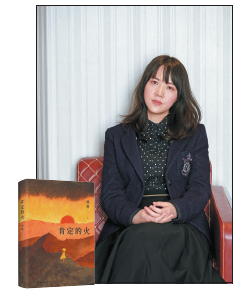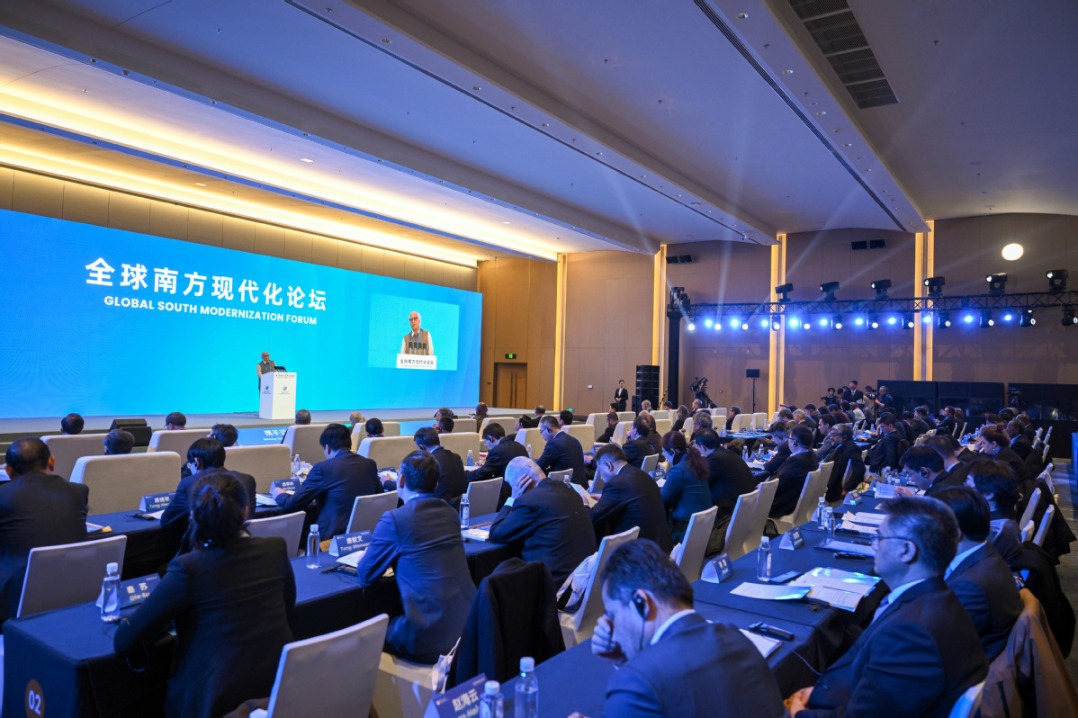Capturing lives of three generations of women in words

Following the trendy topic "Gen Z Shaking Up the Workplace", a sequel-like hashtag "Gen Z Workplace Reformers Go Bankrupt" has gone viral.
Young people born after 2000, who once wanted to "reform workplace norms", are now turning to the channel of the "45-Degree Life Support Club" on social media platform Douban, lamenting the challenges of living a "45-degree life" that rejects both "lying flat" and "rat race" mentalities.
They are becoming more aware of the harsh realities of survival. However, the psychological journey leading to this transformation remains unclear even to those experiencing it. It seems to be many people's life trajectory to find themselves navigating confusion at 20, anxiety at 30, and finding clarity at 40, as they strive to keep up with societal expectations, only to see their passion for life dimming.
In her latest work Kending De Huo (The Fire of Affirmation), published this month, 41-year-old multi-award-winning writer Guo Shuang lays bare this anguish that troubles generations of young people born after 1980, unveiling modern individuals' — particularly women's — most intimate growth dilemmas through three intergenerational stories.
The book collects Guo's three novellas, presenting the resilience and beauty of three pairs of women.
In Jiuchongge (bougainvillea), childhood friends manage to weather life's turbulence with a three-decade friendship, their fates intertwined like flourishing bougainvillea vines.
In Gongzhu (or, Chase the Pig, a Chinese trick card game for four players), a single mother strives to raise her daughter, who is obsessed with star-chasing; their relationship evolves through conflict, compromise and reconciliation.
In Shao Huapi ("burn down the painted skin"), two female writers forge a cross-generational bond through their shared appreciation for the beauty in the details of daily life, sustaining authentic intellectual communication for years.
In a vigorous, philosophical writing style infused with the rhythms of Southwest Chinese dialects, Guo's stories record these women's persistent quest for the truths of life.
In Gongzhu, a starstruck teenager hosting online friends at home confronts her mother's rebuke. The adolescent protagonist's escape from home becomes a journey of self-discovery.
When the 30-something protagonist of Jiuchongge returns home to examine how two intertwined families were cast onto different destinies in historical tides, the journey becomes not about redefining values but clarifying her origins and real desires for life.
The three protagonists in the book — all "daughters" in reality or spirit — strive to comprehend their era, elders and selves while seeking their "affirming fire". Facing biological or spiritual mothers, they have not only natural affection but also respect and detachment.
In Gongzhu, while the adolescent girl battles maternal control, what is most touching is her eventual compassion toward her mother, and her willingness to compromise and comfort her. Guo incisively dissects this essential growth phase: gaining critical distance from one's family often marks the first step toward self-awareness. True maturation lies not in severance but in rebuilding connections through understanding.
The homecoming women in Jiuchongge shoulder family responsibilities, while the narrator in Shao Huapi, inspired by her mentor Jiao Anbai, gains "truth-seeking" courage after Jiao's passing to face her destiny and become her own "affirming fire".
As such, the three novellas portray a complete picture of growth: the recklessness and confusion of youth, the struggles and reconstruction of young adulthood, and the sedimentation and awakening of middle age.
"Her works have depth, vigor, and solidity. She doesn't just sit in her study and come up with stories; she has a certain insight into the lives of ordinary people. She understands a place and the survival of its people," says Ge Fei, winner of the Mao Dun Literary Prize, China's top literature award, in 2015.
Zhang Xinying, writer and professor of Chinese literature at Fudan University, says, "Guo Shuang's narrative progresses through overcoming resistance. It does not display a smooth and light path, but rather the deep imprints left by the friction and engagement between words and the world of life. From this grinding against the spirit and flesh, a full sense of reality emerges, not dazzling but quietly shining."

Today's Top News
- China, US hold maritime safety talks in Hawaii as Beijing reiterates warnings on sovereignty
- China sends letter to UN over Japanese PM's remarks on Taiwan
- Chinese, Uzbek FMs hold second strategic dialogue
- G20 an opportunity to strengthen Sino-EU ties
- China, Africa foster shared food security
- Japan urged to take practical steps to honor its commitments to China






























